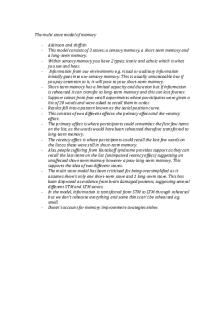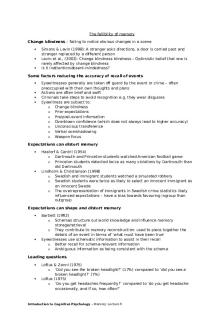CH 9 - The Paradox of Memory PDF

| Title | CH 9 - The Paradox of Memory |
|---|---|
| Course | Introduction to Cognitive Psychology |
| Institution | University of California Davis |
| Pages | 2 |
| File Size | 58.3 KB |
| File Type | |
| Total Downloads | 82 |
| Total Views | 143 |
Summary
Instructor: Sue Hobbs...
Description
The Paradox of Memory
● ● ●
●
●
Hyperthymestic syndrome – the ability to remember almost everything you experienced Savant syndrome – when people with developmental disabilities have genius capabilities incongruent with their mental disabilities Sensory memory – Brief storage of perceptual information before it is passed to short term memory o Remains for brief period of time before it is moved to short term memory or lost o Echoic memory – realize meaning of something you heard a couple seconds ago o Iconic memory – seeing lightning a few seconds after you see it for real Short term memory – lasts 5 to 20 seconds without rehearsal. Can generally hold between 5 and 7 pieces of info o Only lasts up to 20 mins o Also called working memory, where we work on (process and think about about) information o Info then either passes to long term memory or is lost o Rehearsal ▪ Maintenance rehearsal – simply repeating info over and over ● Not very useful in getting info into long term memory ▪ Elaborative rehearsal – linking stimuli to one another in a meaningful way ● Trying to understand the relations between stimuli ● Depth of processing – the more deeply we process info, the better we remember it o Decay – the information fades away over time o Interference – other stuff gets in the way ▪ Can't rehearse because too busy ▪ Two ways interference works ● Info you have already learned interferes with info you are newly learning ● Newly learned info interferes with info you have already learned o Digit span (visual test) ▪ Flash numbers on screen. How many can remember o Memory for sentences (auditory test) o Primacy and recency effects – more likely to remember things we see/hear first and last in list Long term memory – capacity is enormous. About as much info as 500 encyclopedias (1500 pages each) o Info often endures for many years (sometimes permanently) o Explicit memory – things you consciously know ▪ Semantic memory – things we consciously know about the world ● Who was Hillary's main opponent in the current election? ● Who spoofs Sarah Palin on SNL? ▪ Episodic memory – recall of events in our lives
● What did you do on your last birthday? Implicit memory – things you know but do not deliberately recall ▪ Procedural memory – memory for motor skills and habits ● How to tie a shoe ● How to ride a bike ● How to not fall down o Memory processes ▪ Attention – attending to information (paying attention) ▪ Rehearsal – processing info ▪ Encoding – getting info into memory banks ▪ Storage – keeping info in memory ▪ Retrieval – remembering info when it is needed o Encoding specificity – phenomenon of remembering something better when the conditions under which we learn it are the same as when we remember it ▪ Context dependent learning (and retrieval) ● Refers to the external context in which the learning occurred ▪ State dependent learning (and retrieval) ● Refers to internal state in which the learning occurred ● People who learned things when under influence of alcohol remembered those things better when drunk than when sober ● Mood dependent learning – state dependent learning sometimes extends to mood o Tip of the tongue phenomenon – experience of knowing something almost but not being able to recall it ▪ Usually know first letter of word and how many syllables but not actual word Where is memory stored in the brain? o Lashley trained rats to run a maze o Created lesions in different parts of the rats’ brains ▪ Size of lesions affected rats’ memories for the maze, not where was removed o Case study – H. M. had hippocampus removed and allowed scientists to postulate theory of sensory, short, and long term memory o Anterograde amnesia – cannot form new memories o Retrograde amnesia – cannot remember old memories o
●...
Similar Free PDFs

CH 9 - The Paradox of Memory
- 2 Pages

9.) Memory
- 4 Pages

NOVA The People Paradox
- 2 Pages

Rodrik The Globalization Paradox
- 171 Pages

CH 10 - False Memory Debate
- 1 Pages

The multi store model of memory
- 2 Pages

The effect of mood on false memory
- 13 Pages

Tulving - chapter: the memory
- 1 Pages

Lecture 9 - Ch. 9
- 7 Pages
Popular Institutions
- Tinajero National High School - Annex
- Politeknik Caltex Riau
- Yokohama City University
- SGT University
- University of Al-Qadisiyah
- Divine Word College of Vigan
- Techniek College Rotterdam
- Universidade de Santiago
- Universiti Teknologi MARA Cawangan Johor Kampus Pasir Gudang
- Poltekkes Kemenkes Yogyakarta
- Baguio City National High School
- Colegio san marcos
- preparatoria uno
- Centro de Bachillerato Tecnológico Industrial y de Servicios No. 107
- Dalian Maritime University
- Quang Trung Secondary School
- Colegio Tecnológico en Informática
- Corporación Regional de Educación Superior
- Grupo CEDVA
- Dar Al Uloom University
- Centro de Estudios Preuniversitarios de la Universidad Nacional de Ingeniería
- 上智大学
- Aakash International School, Nuna Majara
- San Felipe Neri Catholic School
- Kang Chiao International School - New Taipei City
- Misamis Occidental National High School
- Institución Educativa Escuela Normal Juan Ladrilleros
- Kolehiyo ng Pantukan
- Batanes State College
- Instituto Continental
- Sekolah Menengah Kejuruan Kesehatan Kaltara (Tarakan)
- Colegio de La Inmaculada Concepcion - Cebu






